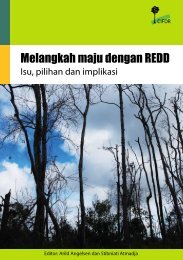Adaptive collaborative management of community forests in Asia ...
Adaptive collaborative management of community forests in Asia ...
Adaptive collaborative management of community forests in Asia ...
Create successful ePaper yourself
Turn your PDF publications into a flip-book with our unique Google optimized e-Paper software.
CIFOR is a lead<strong>in</strong>g <strong>in</strong>ternational forestry research organisation established <strong>in</strong> 1993 <strong>in</strong><br />
response to global concerns about the social, environmental, and economic consequences<br />
<strong>of</strong> forest loss and degradation. CIFOR is dedicated to develop<strong>in</strong>g policies and<br />
technologies for susta<strong>in</strong>able use and <strong>management</strong> <strong>of</strong> <strong>forests</strong>, and for enhanc<strong>in</strong>g the wellbe<strong>in</strong>g<br />
<strong>of</strong> people <strong>in</strong> develop<strong>in</strong>g countries who rely on tropical <strong>forests</strong> for their livelihoods.<br />
CIFOR is one <strong>of</strong> the 15 centres <strong>of</strong> the Consultative Group on International Agricultural<br />
Research (CGIAR). With headquarters <strong>in</strong> Bogor, Indonesia, CIFOR has <strong>of</strong>fices <strong>in</strong> Brazil,<br />
Bolivia, Burk<strong>in</strong>a Faso, Cameroon, Ethiopia, India, Zambia and Zimbabwe, and it works<br />
<strong>in</strong> over 30 other countries around the world.<br />
Donors<br />
CIFOR receives its major fund<strong>in</strong>g from governments, <strong>in</strong>ternational organizations,<br />
private foundations and regional organizations. In 2006, CIFOR received f<strong>in</strong>ancial<br />
support from Australia, <strong>Asia</strong>n Development Bank (ADB), African Wildlife Foundation,<br />
Belgium, Canada, Carrefour, Cec<strong>of</strong>orma, Ch<strong>in</strong>a, Centre de coopération <strong>in</strong>ternationale<br />
en recherche agronomique pour le développement (CIRAD), Convention on<br />
Biological Diversity, Cordaid, Conservation International Foundation (CIF), European<br />
Commission, F<strong>in</strong>land, Food and Agriculture Organization <strong>of</strong> the United Nations<br />
(FAO), Ford Foundation, France, German Agency for Technical Cooperation (GTZ),<br />
German Federal M<strong>in</strong>istry for Economic Cooperation and Development (BMZ),<br />
German Foundation for International Cooperation, Global Forest Watch, Indonesia,<br />
Innovative Resource Management (IRM), International Institute for Environment and<br />
Development, International Development Research Centre (IDRC), International Fund<br />
for Agricultural Development (IFAD), International Tropical Timber Organization<br />
(ITTO), Israel, Italy, the World Conservation Union (IUCN), Japan, Korea, MacArthur<br />
Foundation, Netherlands, Norway, Netherlands Development Organization, Overseas<br />
Development Institute (ODI), Peruvian Secretariat for International Cooperation<br />
(RSCI), Philipp<strong>in</strong>es, Spa<strong>in</strong>, Sweden, Swedish University <strong>of</strong> Agricultural Sciences<br />
(SLU), Switzerland, The Overbrook Foundation, The T<strong>in</strong>ker Foundation Incorporated,<br />
The Nature Conservancy (TNC), Tropical Forest Foundation, Tropenbos International,<br />
United States, United K<strong>in</strong>gdom, United Nations Environment Programme (UNEP),<br />
United Nations Educational, Scientific and Cultural Organization (UNESCO), United<br />
Nations Forum on Forests (UNFF), Wagen<strong>in</strong>gen International, World Bank, World<br />
Resources Institute (WRI) and World Wide Fund for Nature (WWF).
















